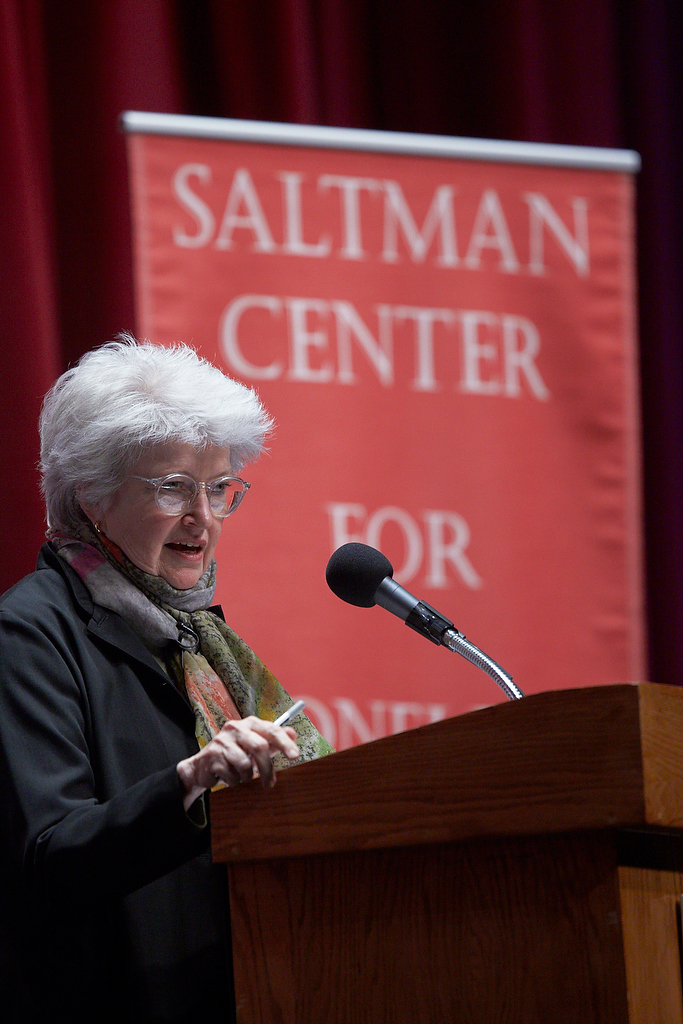Linda Wertheimer Offers Methods to Cool the Fires of Partisan Politics
Why can’t we all just get along? National Public Radio senior national correspondent Linda Wertheimer discussed that issue during a recent speech as part of the Saltman Center for Conflict Resolution’s Peace in the Desert lecture series in UNLV’s Artemus W. Ham Hall.

“We’re in a difficult period here, and we need to get out of it,” Wertheimer urged.
As a snapshot of the current political climate, Wertheimer contrasted a politician from the 1960s referring to a political opponent as a “gentleman” he “holds with minimum high regard” with Congressman Joe Wilson, a Republican from South Carolina who shouted “you lie” at President Barack Obama in 2009 while the president was giving a speech about healthcare.
“How did we get from ‘minimum high regard’ to you lie?” Wertheimer asked.
Looking back, Wertheimer said she believed that partisanship began to take on an extreme character when Newt Gingrich became Speaker of the House in 1994. From her vantage point, earlier congresses, including the one sitting in 1972-73 when the Watergate scandal took place, were not rife with partisanship. For example, the vote in the judiciary committee to impeach President Nixon was a bilateral one, and the members had tears in their eyes by the time the count was over. But the GOP was almost completely ejected from Congress by the 1974 election, spending years in the wilderness until Mr. Gingrich refocused them on being elected instead of governing and making use of every technique they could, fair or foul, to win those elections. Wertheimer dates the actual escalation of partisan politics to Gingrich and his winner-take-all philosophy.
Wertheimer cited an immediate cause and an overall, general cause of the partisanship within the current political scene. She said the immediate cause is the goal of Republicans in Congress to do “whatever it takes” to make sure that Obama does not get a second term as president. Making this decision, she explained, leads to gridlock, as Republicans say no to everything suggested by the president.
“It has frozen the Congress,” Wertheimer said.
The other bigger issue, she asserted, is the economy.
“(The economy) has created this terrible, sinking feeling that maybe things are not going to return to normal anytime soon,” she said. “The bad economy, it seems to me, and the national upset, is giving the Republicans and the Tea Party a shot at major influence in this country, helped by a president who has made some mistakes.”
Wertheimer said Obama failed to understand how seriously he should have been focusing on jobs, as opposed to issues like healthcare.
“The American people are not disposed to forgive him for that,” she said, citing to several polls released by the Washington Post that show that he will face a tough fight in the upcoming election.
Wertheimer claimed, however, that Republicans are not in position to take full advantage in the upcoming election because the current potential candidates are too numerous and are unable to get along with one another. In addition, Wertheimer said that a number of Americans see Republicans as the party of the rich and believe that the wealthy should be taxed more.
Wertheimer suggested a few ways to bring the country together. The first?
“Fix the economy,” she said.
Wertheimer said that people should work together in order to figure out how to fix the economy in order to put everyone in “a much better mood.”
The other solution Wertheimer proposed was restructuring Congress in such a way that it would be forced to talk to itself. She suggested that in order to achieve this goal, people should pay more attention to the redistricting process that occurs every decade.
Wertheimer said that 90 percent of the time, when an incumbent runs, that incumbent is re-elected, leading to Congress being a more stagnant, safe-seated body. She blamed gerrymandering of districts.
“This is probably the most bi-partisan thing that happens in the process,” she said, stating that the lines are drawn to preserve members of Congress.
In addition, Wertheimer said that incumbents are more vulnerable in primaries than in general elections because the people who have stronger views generally are the ones who turn out to vote. As a result, she noted, politicians tend to cater more toward the extremes ideologues of each side, leading to a more partisan division and straying from the middle of the political spectrum. Wertheimer said that paying more attention to fair redistricting would bring people together and dispense with partisanship.
Wertheimer also suggested that mandatory voting could be a way to get rid of partisanship—a strategy that has been working in Australia, where citizens receive a ticket if they fail to vote. Wertheimer said that rather than being considered an infringement of rights, Australians see this as a way to be more involved.
Wertheimer observed that money has also been a big factor in contributing to the partisanship of elections today, saying that the 2012 election contributions will “break records.”
In addition, she said, the media has contributed to the political changes. News has expanded to include bloggers and 24-hour broadcast news. In addition, Wertheimer pointed to websites like YouTube.com, which has led to the downfall of several campaigns by giving the public a medium to share videos on a worldwide forum that the public would not otherwise have seen.
“It’s such an extraordinary weapon, the Internet,” Wertheimer said.
Wertheimer concluded by offering a ray of hope to the listeners—that although the economy seemed bad, the United States would persevere. She said everyone should do the best they could to make things better.
“I will be the first to tell you, if I can, when I think we are having fun again,” she said.